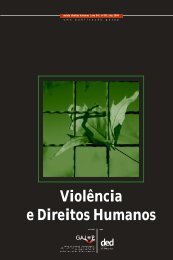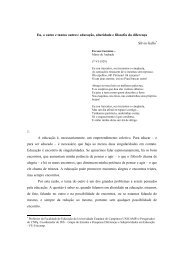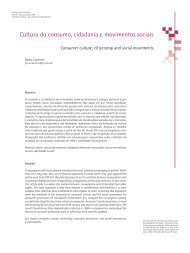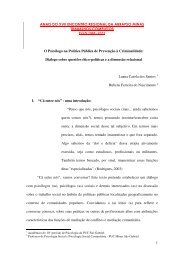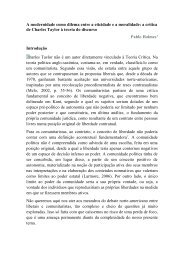44To these reasons, one other justification may be added: to acceptthat criminals and state agents violate rights on equal terms is, to a certainextent, to equate them! This, though, is not possible, for the simplereason, among others, that society does not demand criminals that respecthuman rights; society desires simply that there be no criminals. In fact,from a logical perspective, it is senseless to demand that criminals respecthuman rights given that violating these rights is the essence of criminality.With regard to the State, the demand is just the opposite: that the Stateexist as the repository of legitimate violencethat is, violence used to protectthe public and to respect human rihts. In this sense, State disrespect forhuman rights is even more deplorable. Of course, the pain may be thesame for the victim . . .But if we agree with Uprimmy, why call attention to violations ofthe security of persons when committed by criminals within theframework of reflection on human rights? Because the insecurityprovoked by criminality creates an atmosphere replete with potential foraccepance of violations committed by the State itself! On this point, it isnecessary to turn to a few reflections based on research data that give usfood for thought.Several studies on criminality and forms of punishment havenoted that public opinion is not uniform but rather subject to fluctuationoften based on particularly revolting crimes. Let us examine, for example,the death penalty. In September 1991, a survey by the leading Datafolharesearch center found that 46% of Brazilians interviewed supported thedeath penalty, while 43% opposed, a virtual tie in statistical terms. A yearand a half later, in February 1993, the same institute repeated the survey,this time shortly after two high profile crimes shocked Brazilian publicopinionthe murder of actress Daniela Perez in Rio de Janeiro and thekidnapping and killing of Miriam Brandão, a girl in Belo Horizonte. Thesecond survey demonstrated a significant shift: 55% of those interviewedexpressed support for the death penalty while only 38% opposed the44draconian measure.Another example, closer to our analysis. In October 1999, in the44. Luis Francisco Carvalho Filho, O que é Pena de Morte (São Paulo: Brasiliense, 1995), 68.
45midst of a series of escapes and riots by juveniles in detention facilities[known as FEBEM centers in São Paulo], complete with explicit televisedimages of the violence, a survey of São Paulo residents conducted by thefirm Brasmarket and reported in the October 13 issue of IstoÉ magazine,showed that 91.4% supported reducing the age of criminal responsibilityfrom eighteen to sixteen, while only 6.8% opposed such a measure! Thatsame study demonstrates an increase in the percentage of persons surveyedsupporting the death penalty: 38.6 stated clear support; 28.5% opposedthe measure, and 28.5% indicated that "it depends." If we consider that thislast position admits, at least in theory, the possibility of the application ofthe death penalty, the total number of São Paulo residents not opposed tothe death penalty reaches 67.1%. Other examples abound.In sum, figures like these suggest that the more people are exposedto crime, the more they tend to support solutions to the violence thataffects them based on force. In this case, efforts to create consciousnessamong the general population concerning the importance of humanrights, efforts that characterize the action of rights activists, appearsomewhat limited in their ability to persuade potential allies. This is not tosay that educational activites in this area are not important. To thecontrary, results from other studies suggest that a person's cultural level isone factor influencing her or his opinion regarding methods of crimecontrol.Frequently, in these studies, opinions on forms of punishment ofcriminality are not equally distributed among all strata of societycomposing public opinion. To the contrary, a certain regularity may beobserved: the closer to the most disfavored social strata in terms ofeducation level, the greater the possibility of support for violent solutionsto the problem of criminality. In the second Datafolha study cited above,for example, support for the death penalty fell as the level of education of45the persons interviewed increased. More recently, another study of citizensupport for extrajudicial police action (action that constitute, therefore,violations of human rights) surveyed 1,043 persons in Rio de Janeiro,asking them, among others, the following question: "In some cases, ispolice torture of suspects to obtain information justifiable?" Those who45. Ibid., 68.
- Page 1 and 2: Extrajudicial, Summary or Arbitrary
- Page 3: In memory of all the victims ofextr
- Page 6 and 7: PART TWO1. Cases of Extrajudicial,
- Page 9: 91IntroductionINTRODUCTIONThe prese
- Page 12 and 13: 12Executive Summary2Homicide has re
- Page 14 and 15: 14overall, in cases with indicia of
- Page 16 and 17: 16A Brief Overviewof Extrajudicial,
- Page 18 and 19: 18equally valid in the case of extr
- Page 20 and 21: 20With the gradual transition from
- Page 22 and 23: 22carry out land reform.This practi
- Page 24 and 25: 24extrajudicial, summary or arbitra
- Page 26 and 27: 26Next, we analyze a subset of thes
- Page 28 and 29: 28At the same time, the public inte
- Page 30 and 31: 30dia-reported cases is registered
- Page 32 and 33: 32Of these media-reported cases att
- Page 34 and 35: 34POLICE VIOLENCEIn the State of S
- Page 36 and 37: 36Table 05:Distribution of Victims
- Page 38 and 39: 38Analyzing media-reported homicide
- Page 40 and 41: 40Tabela 10:Distribution of Victims
- Page 42 and 43: 42The discourse that characterizes
- Page 46 and 47: 46responded favorably (either "agre
- Page 48 and 49: 48Legal Aspectsof Extrajudicial,Sum
- Page 50 and 51: 50one-year legacy of authoritariani
- Page 52 and 53: 52the crime of torture in accordanc
- Page 54 and 55: 54The research presented in this re
- Page 56 and 57: 56impunity stimulates the practice
- Page 59: Part Two
- Page 62 and 63: 62delay, the accused were freed in
- Page 64 and 65: 64as Lea, who affirmed that he was
- Page 66 and 67: 66Rodrigues then kicked the victim'
- Page 68 and 69: 68penitentiary agent Severino Augus
- Page 70 and 71: 703.2. Welington Carlos de Melo, 17
- Page 72 and 73: 72shotgun, injuring Odete Cavalcant
- Page 74 and 75: 74Upon hearing the youths' explanat
- Page 76 and 77: 76carried the minor by his feet to
- Page 78 and 79: 78threatening them with a .38 calib
- Page 80 and 81: 80The police were accused in an Osa
- Page 82 and 83: 82a police station. His mother drov
- Page 84 and 85: 84hands on the roof of the car when
- Page 86 and 87: 86the bathroom. When the police fou
- Page 89 and 90: 89253Recommendations2.1 Invite the
- Page 91 and 92: 91should be authorized to subpoena
- Page 93 and 94: 93and psychological assistance.2.9
- Page 95 and 96:
952.14 Absolutely Prohibit the Use
- Page 97:
972.19 Create a System of CriminalD
- Page 101 and 102:
101ANational HumanRights Movement(M
- Page 103 and 104:
103victims of homicides, it is equa
- Page 105 and 106:
105Ceará, Piauí, Rio Grande do No
- Page 107 and 108:
10713. Mott, Luiz. Violação dos D
- Page 109 and 110:
109In Brazil, CRS supports local pa
- Page 111 and 112:
111human rights organizations locat
- Page 113 and 114:
113National Human Rights Movement(M
- Page 115 and 116:
115rapporteurs to develop civil soc
- Page 117 and 118:
117AcknowledgmentsTo the Brazilian
- Page 119 and 120:
119Office for Legal Assistance to G



